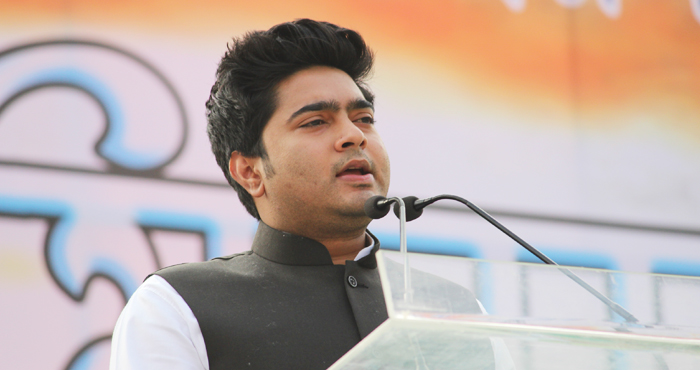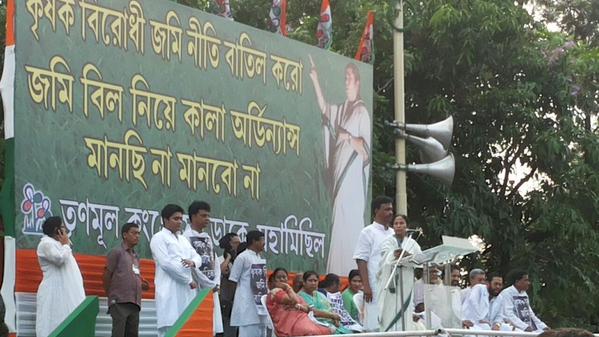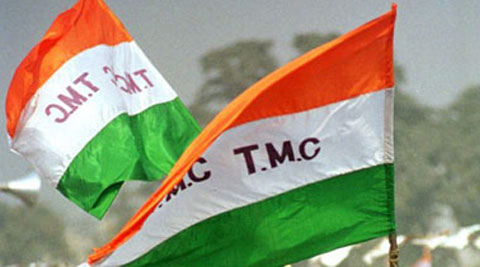Full transcript:
Sir, today we are debating the Right to Fair Compensation and Transparency in Land Acquisition, Rehabilitation and Resettlement (Amendment) Bill 2015.
Sir, at the outset, I on behalf of my party, through you we would like to inform that we are opposing the Bill completely. We opposed it on a point when in 2013 the Bill came that for the private enterprises, private industrialists 80% consent for purchase and 20% acquisition. That time also we opposed it, today also we are 100% opposing.
Sir, I am making it very clear to all of my friends here, please all of you from the core of your heart oppose the Bill for safeguarding the interest of the farmers of the country.
Sir, I will quote Rabindranath Tagore, “Jodi tor dak shune keu na ashe, ekla cholo re.” In case, I do not get anyone with me, I will walk alone to oppose this Bill.
Sir, we have background of this. In 2007 when nobody raised voice, on behalf of the farmers when land was acquired at Singur for the Tata Project. Mamata Banerjee went into a fast for 26 days at Dharmatala, Kolkata, for protecting the interest of the farmers. We have history of long struggle towards the interest of protecting farmers’ rights.
One of my brothers Suvendu Adhikari is also here witness to how Mamatadi fought for Nandigram. Suvendu Adhikari, who belongs to that place also fought for it. We have politically fought for taking away the land of Nandigram with the then the Government firing and later it became a case for investigation too. Sir, at various places we are struggling for farmers’ rights from 2007 and today we are also protesting against this Bill.
Our friends just quoted Gandhi Ji. Sir, I would just like to quote, from a letter written by Mahatma Gandhi to Madanlal Gandhi on August 21, 1910, “I, for one, am a farmer and I wish you all to become farmers or to continue as such, if you have already become farmers. My way of life has completely changed here. The whole day is spent here in digging the land and other manual works instead of writing and explaining things to people. I prefer this work and consider this alone to be my duty.”
Sir, in ‘Indian Opinion’ on December 3, 1990. Gandhi Ji wrote about the farmers. I would like to quote it Sir, “Of course the farmer is the father of the world, but it is his greatness that he is not aware of the fact. Those who devote themselves to good works of any worth are not aware of about their goodness. Just as we breathe every moment, but are not aware about the fact. The good people by their very nature are impelled to give expression to their goodness. They are not conscious that they deserve any credit. They do not care to be honoured.”
Sir, today by this Amendment, this honour of the farmers, the credit of the farmers of this country are being taken away. The right which has been recognised by the parent Act concerned in 2013 has been taken away. Even though we objected for 80% purchase and 20% acquisition, but Chapter Two and Chapter Three, which came due to a number of discussions in the House, between the then Minister and other political parties, today that right has been taken away.
Sir, what is chapter Two and Chapter Three? I will come to the details of chapter Three later on. In one sentence, Chapter Two speaks about the determination of social impact and the utility of the public purposes, which recognises the right of the farmers. Sir, the right is being taken away by this Bill.
Chapter Three is provision to safety and food security. This Chapter 3A is being taken away. So far this food security is concerned; we are opposed to any compromises. We are opposing to this by tooth and nail.
Sir, this Bill is in respect of provisions of Chapter Two and Chapter Three not applicable to certain projects. Sir, why should they not be applicable? Sir, it has been given that in case of defence infrastructure, affordable housing, industrial corridor and social infrastructure project including the projects under public-private partnership, where the ownership of the land will continue to vest with the Government.
By this process, the right of hearing of the farmer is being taken away. Earlier it was Article 13 (1A) of the Constitution. It has been deleted. Now Article 300A of the Constitution has come. This is a right of a property. Land is also a right of a property of a person. That right of property of a person is being taken away, without any hearing, without anything. How can I think about this? How can I reconcile the right of a farmer, a right of a land, a right of a property is being taken away totally without offering any opportunity of hearing. Unfortunate!
Sir, were these projects not there before? Sir, if you speak about the urgency, Section 9 of the parent Act speaks where land is proposed to be acquired invoking the urgency provisions under Section 40, the appropriate Government may examine, undertaking the social assessment impact study. Therefore, there was a provision. If urgency is there and if you feel that it is urgent, the parent Act has given power under Section 9. Why in general are you taking away the right of a farmer, the right of a hearing, the social impact assessment? Hearing should happen in public, municipality, gram panchayat and everybody should be participating.
What is the second impact? If the view has come, it is to be seen if it has a utility for the public purpose or not. That is being taken away.
Thirdly, valuable right of the farmers is being taken away, Sir.
Sir, if you read the first Section Three of the provisions is being included which is, “provided also that the acquisition for the projects listed in Section 10 (A) purposes specified therein, shall be exempted from the provisions”. What are you taking away? You are taking away special provisions to the Scheduled Casts and Scheduled Tribes. In the Scheduled Cast rank and Scheduled Tribe rank, in the parent Act, it has been given that acquisition should not be done in a routine manner. Unless, it is a rarest of rare exceptional case, you should not touch lands of Scheduled Casts or Scheduled Tribes.
By this Bill, itself; the Government is taking away the rights of the Scheduled Casts or Scheduled Tribes in case of their concerned land. It is not the case of the rarest of rare, it is the case of a general nature in character.
What was the object, Sir? Kindly see Section IV. It said, carry out a social assessment study in consultation with them. I referred the names already. In consultation with the names, it has to be given. Total social impact assessment, public hearing for social impact assessment, publication of social impact assessment, everything has been taken away. There was an important provision in the Statute which is being tried to be diluted with this concerned Bill. That the expert group constituted on the sub-section I, is of the opinion that the project does not serve any public purpose, the social cost or adverse social impact of the project outway the potential benefits, this provision is being taken away. Ultimately, we have seen a number of cases where the acquisition has been undertaken but ultimately, acquisition has not been finalised. Farmers have not got back the land concerned. Once the acquisition has started, compensation has been paid; farmers are not getting back lands even if projects are being failed. Therefore, if this social impact study is not done, can you determine whether it is for public purpose or not?
With great respect to any Ministers, administrative officers sitting in the air-conditioned chambers, no one can understand what the public purpose is there. Public purpose has to be understood going into the field itself, whether the land really serves any public purpose at all or not.
Very importantly for which we have been fighting for long, regarding the food security, our leader repeatedly said, wherever multi-crop land is there, it cannot be taken. We faced this situation at Singur. Singur was a multi-crop land, Nandigram was a multi-crop land. One fine morning, one industrialist comes to Kolkata, wants to stay near Kolkata, he chooses a piece of multi-crop land and that multi-crop land is given to him for the purpose of industry. Why should he get a multi-crop land? Why should he get it? The Section 10 has been diluted in this concerned Bill. Therefore Sir, this is totally nullifying.
Sir, Section X, sub-Section III, a very important right has been given to the farmers – wherever multi-crop land is acquired under sub-Section II, an equivalent area of cultivable wasteland shall be developed for agriculture purpose and amount equivalent to the land acquired shall be deposited. Under the scheme of the parent Act concerned, wherever the land of multi-crop is there, if you take away you have to make an alternative land for the purpose of the farmers along with the all compensation. If this provision is also being taken away, then you have to lose everything. In this process, every right under Chapter Two and 3A, every right of the farmer is being taken away by this Bill. We are opposing this Bill.
Sir, through you I want to say that our Leader right from 2009, repeated tried and written note was given to the Government how a social system has to be introduced. How the rights of the farmers, even in a case of compulsory acquisition, under sovereign function, how the government should do it. That time the Government sat with our Chief Minister and had discussed the matter at length. Almost all the suggestion of Chapter Two and Chapter Three is concerned, the then Minister accepted it. Here it was discussed and Bhartiya Janta Party then had supported the same.
To the Nation, I want to communicate through you Sir, Mamata Banerjee went on fast for 26 days, that time today’s Minister Rajnath Singh Ji for whom we are having great respect, he went and met her. He was with Didi that time spending nearly three to four hours. On that day, he spoke about the right of the farmers, so I do not understand today why Rajnath Ji is supporting this Bill. What he spoke in 2007 at Kolkata that was a reflection in 2013 Bill. Why the right is being taken away. What is the spirit?
I have great respect for Rajnath Ji. By the process, I want to make a humble submission to Rajnath Ji that you stood with us in 2007 for upholding the rights of the farmers. Today, the time has come for you to stand for the right of the farmers and give the right of natural justice, nothing more. The social impact system has two purposes, one, if it is very relevant for the public purpose then the fair compensation can be determined. For the purpose of determination of the fair compensation, Chapter II and Chapter III are needed. You are taking the right of fair compensation; you will give whatever the market value is given, by Chapter II and Chapter III. The basic formula of determination of compensation that is being fixed is being taken away. I am opposing this Bill. Sir, it is really important that by this Bill itself, the basic structure of Chapter II and Chapter III is being changed. This Amendment is nothing; they are just nullifying the object, the reasons and the basic structure of Chapter II and Chapter III of the current Act. I understand that you have love for the corporate; I understand that you have to do only for the corporate. You are a Government for the corporate; by the corporate; of the purposes of the corporate. We can understand that part. But don’t do this.
I am a small man, you are such a tall man, you are a stalwart, I can appeal to you, Sir. If I am right you will support the Bill. You also said that this Bill should be there. Why are you diluting it, Sir? Since you have raised this issue Sir, I have an appeal to you on that day the stand you had taken, take the same stand today also. That is my appeal to you Sir, nothing more than that.
Right of farmers cannot be nullified at all. Sir, I will finish with just one observation – an opinion of Gandhiji that was published in Hindustan Standard, on 6 December 1944, I quote, ‘”After all, this industrialisation of large scale production are only of comparatively recent growth. We do not know how far it has contributed to the development of our happiness but we know this much that it has brought in his wake the recent world laws. The second world war is still not over and even if it comes to an end we are hearing of a third world war. Our country was never so unhappy and miserable as it is at present. City people may be getting big profits and good wages, but all that has been possible by sucking the blood of villagers. We do not want to collect Lakhs and Crores, we do not want to always depend on money for our work. If we are prepared to sacrifice our lives for the cause, money is nothing. We must have faith and we must be true to ourselves.
Sir, this Bill is an attempt to suck blood out of the farmers of our country. Sir, the Government is having a social responsibility towards the country. The Government is not for purpose of making profit only. The Government has to think for the people at large. The Government has to think for the poor people first. The Government has to give the priority to the farmers first, who are the backbone of our country.
With this Sir, I oppose this Bill 100%. All my friends and members who are present here, from your core of heart kindly oppose the Bill. I conclude in line with Mr Scindia, when tomorrow this Bill will come for voting, everyone please oppose this Bill. Tell the Nation this Government is Government for the corporate. This Government is anti poor government. This Government is anti farmer government. This Government will sell the country to the industrialists, let us oppose this Bill.












